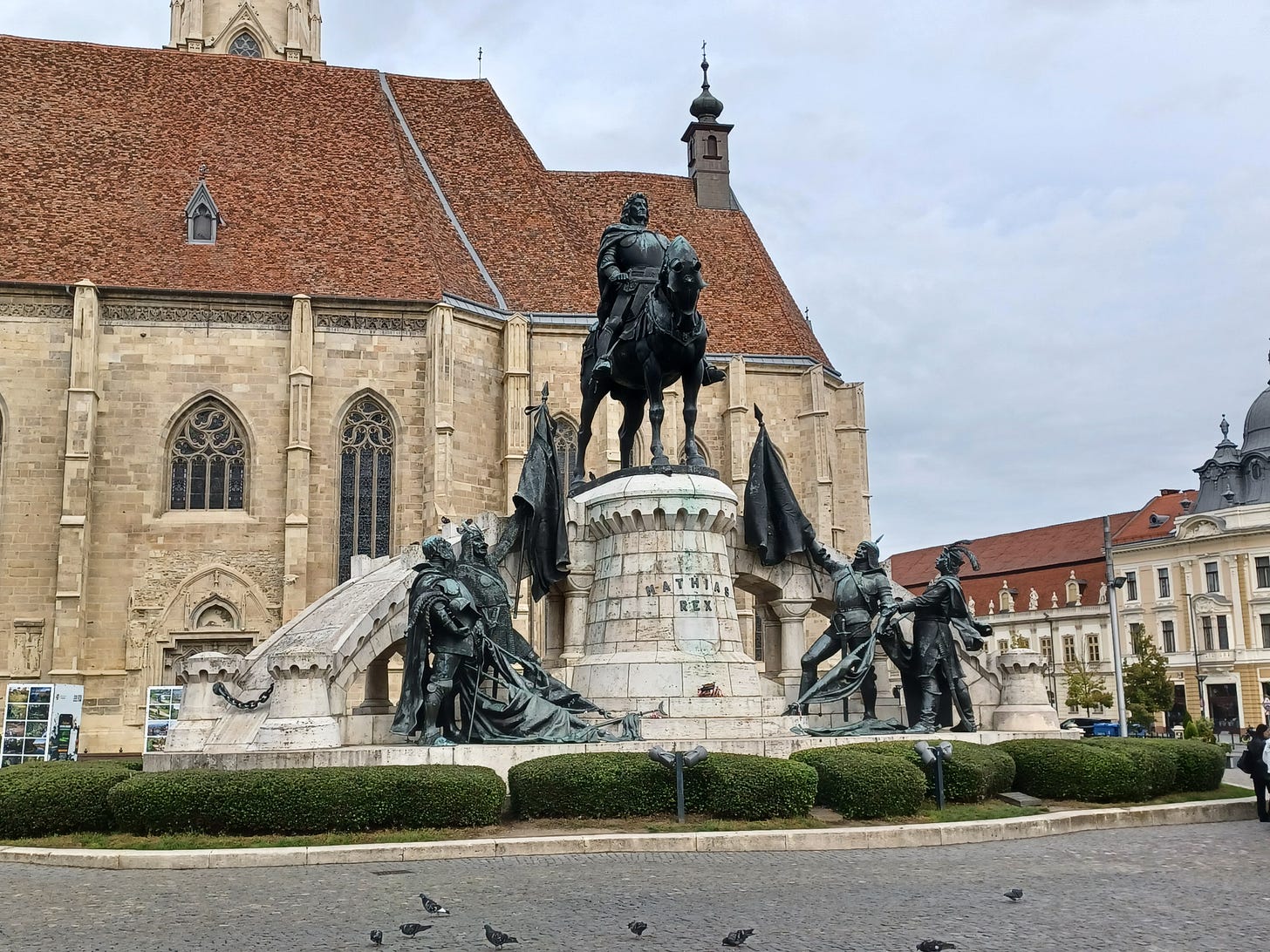Last week I was in Cluj Napoca, Transylvania. I was asked to give a keynote address for Academic Year Opening at Mathias Corvinus Collegium. Here’s what I talked about.
Matthias Corvinus Monument (photo by the author)
Today we live in an “Age of Discord”—a period of social turbulence and political violence that can last many years and even decades. Ages of Discord have afflicted complex human societies, organized as states, for millennia, and it now turns out that our society is not an exception. What kinds of lessons do previous Ages of Discord teach us? And how can these insights help young people plan their lives in these turbulent times?
My remarks will be organized around two general themes: knowledge and power. When I talk about knowledge, I don’t mean only academic knowledge and useful skills that you learn in the university, which enable you to get a good job. Equally important is understanding the world and why things happen as they do. This is what I devoted my professional life to. Why do Ages of Discord repeatedly afflict human societies, roughly every couple of centuries or so? If you want to hear my answer to this question, come to my lecture tomorrow. This is key knowledge, because understanding the causes of Ages of Discord makes it much easier for us to end such “End Times” and arrive at new beginnings.
One lesson that I learned from the analysis of historical Ages of Discord is that they feed on mutual misunderstanding, polarization, and reciprocal hatred between opposing groups. Just look at how the assassination of the conservative activist Charlie Kirk is perceived by Americans. One side, the so-called “left,” is celebrating, while the other, the “right”, is mourning. Here in Europe we see similar divides. One side hates “illiberal autocratic regimes” such as that of Viktor Orbán in Hungary, while the other side loves to hate the “globalist” or “Atlanticist” elites, such as Ursula von der Leyen.
What this means for you is that you need to leave your comfortable “echo chambers” and make a real effort to learn the point of view of those whom you perceive as “the enemy.” Understanding is the necessary precondition for action that will improve the situation, rather than make it worse.
But understanding is not enough, to change the world for the better you also need power. You may feel uncomfortable with this topic; somehow “power” feels dirty, for example, when it is used by dictators or corrupt politicians to benefit themselves. But power is like fire, which can burn you, or used to cook your meal and warm your house.
Specifically, I want to talk about social power, because positive change comes only through organized collective action. A single individual can burn a temple down, but he cannot build it by himself.
Sociologists distinguish four main kinds of power: coercion, economic, administrative or political, and ideological or persuasion. I won’t talk about the first one, brutal force, because it is both illegal and immoral and, anyways, surprisingly least effective. But the other three offer you three routes to gaining power to change things for the better.
Thus, one road is to become an entrepreneur, start up a successful business, and gain a lot of wealth. This will enable you to use your wealth to finance organizations that work for good causes. Money is the lifeblood of politics. Without it, no organization can achieve its goals.
Another route is administration or politics. You can become a public servant and work your way up the bureaucratic hierarchy. Or you can organize or join a social movement or a new political party.
The final road is to become an influencer. In the old days you would become a journalist or columnist, but today mainstream media has lost most of its power and is becoming increasingly irrelevant. Social media is where the action is—think about how much power someone like Joe Rogan wields. But there are thousands of lesser known influencers who also can advance good causes.
One more thought. Nothing prevents you from employing more than one kind of social power. As an example, Elon Musk first gained enormous wealth—that’s economic power. Then, he bought Twitter (now X). This gave him enormous power to persuade people. Finally, and briefly, he became part of the administration with his DOGE initiative (before his falling out with Donald Trump). Again, Elon Musk (just as Joe Rogan) is on top of the power pyramid, but you don’t need to get to a similar pinnacle in order to be able to make a difference.
Let’s return to what I started with. We live in very turbulent times and they will continue for years, if not decades. Chances of things escalating into a hot civil war in America or Europe are, unfortunately, rising. You may feel lost and powerless, like a small boat tossed around in a rough ocean. But what I am telling you is that things are not as hopeless as they may seem. You need understanding and power to navigate this rough ocean, and you can gain both. And our Ages of Discord will eventually end. History shows they always do. “This too shall pass,” and your generation has the power to bring the dawn of the new world closer.



Great, thanks.
Any transcript, audio/video available ?
I don't know who Prof. Turchin thinks the left is, but he isn't telling the truth when he says the left is celebrating Kirk's death. There are no significant numbers of people and no---I repeat, no---significant people celebrating Kirk's death. And no practicing politicians I know of have passed on the opportunity to denounce violence. What Prof. Turchin has done here is uncritically endorse right wing canards. implicitly approving the extremely right wing campaign to turn Kirk into the modern equivalent of Horst Wessel, or at least John Birch.